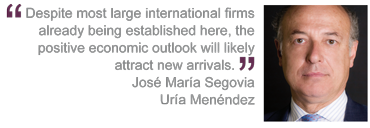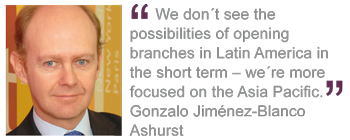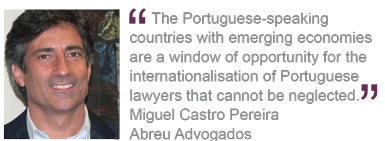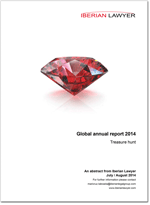Global Special Report 2014: Treasure hunt
Opportunites abound for law firms in jurisdictions around the world, but get your firm´s strategy wrong and you will run the risk of missing out
No two law firms´ international strategies appear to be the same. While one international firm has recently taken the plunge and opened two offices in Mexico, for example, managing partners at other firms express severe doubts about the Mexican economy´s potential to supply a steady stream of profitable legal work.
One of the arguments put forward by the sceptics is that Mexico will suffer due to its over-reliance on the US economy, which is in currently contracting. Meanwhile, there is also considerable debate among lawyers about the need for offices in Latin America, with some arguing that successful Latin American practices can be run from New York or Washington D.C., for example. Yet other lawyers at Spanish firms argue that rather than focusing on Latin America, resources are put to better use expanding operations in Asian markets. That said, firms must choose their Asian markets carefully, with some managing partners having grave concerns about the Japanese market, for example, where some US firms, in their desperation to grow their practices in the jurisdiction are offering to work on deals for free.
There seems to be considerable more consensus about the most promising opportunities for Portuguese firms. Lusophone Africa – particularly Angola and Mozambique – have long offered Portuguese practices substantial growth opportunities and this is expected to continue for at least the next decade, if not longer. This is a source of considerable encouragement to managing partners in Lisbon, who are fully aware that without the opportunities offered in Africa, the downsizing of their firms would be inevitable.
Global firms to strengthen in Spain
To begin by looking at the Iberian market, José María Segovia, senior partner at Uría Menéndez, expects some international firms will look to boost their global networks by opening offices in Spain. “The Spanish economy has taken its first steps towards recovery in the past 12 months – international investors are showing greater interest in Spanish assets, which directly affects law firms,” he says. “The most active areas are M&A, capital markets and real estate – despite most large international firms already being established here, the positive economic outlook will likely attract new arrivals.” In comparison, few lawyers expect international firms to boost their presence in Portugal in the near future as the market is seen as too small to sustain new players.
With regard to foreign markets, Segovia says Spanish and Portuguese-speaking countries with potential for fairly significant growth – such as Mexico, Peru, Chile, Colombia, Brazil, Angola and Mozambique – “offer magnificent prospects”. He adds: “These countries are also investing heavily in Europe and Asia, thus providing Spanish and Portuguese firms with the scope to work on both inbound and outbound transactions.”
Hogan Lovells Latin American strategy involves focusing on key jurisdictions, including Brazil and Mexico, according to Burkhart Goebel, the firm´s continental Europe regional managing partner. To this end, the firm recently announced it would be merging with Mexican firm Barrera, Siqueiros y Torres Landa (BSTL). This means Hogan Lovells now has offices in Caracas, Rio de Janeiro, São Paulo, Mexico City and Monterrey.
Commenting on the merger at the time, Hogan Lovells CEO Steve Immelt said 2013 had “brought major structural reforms for Mexico, which could create for investors and companies in a wide range of industries”. He added that Hogan Lovells understood the potential Mexico offers global clients and the importance of having full service capabilities on the ground in the region.
Goebel says the firm´s new Mexican offices will aim to build on Hogan Lovells´ existing presence in Venezuela, particularly its work in energy and arbitration.
 Doubts about Mexico
Doubts about Mexico
However, not all firms share Hogan Lovells´ confidence in the Mexican market. One partner says there is a “question mark” over the Mexican market. “Mexico has a strong dependence on the US economy,” he adds. “Mexico will suffer because the US economy is shrinking.” Indeed, data shows that the US economy shrank by 2.9 per cent in the first quarter of 2014, its worst performance for five years – this came as somewhat of a shock as it had previously been estimated that the economy would shrink by only one per cent. The partner says: “Mexico´s performance in the Pacific Alliance has been significant, but can Mexico forge an identity of its own?” He adds that his firm has “no significant presence” in Latin America, but acknowledges that Latin America is a “key strategic market” for Asian clients.
But Fernando de las Cuevas, head of mergers & acquisitions at Gómez-Acebo & Pombo, argues that Mexico is one of the Latin American countries offering better opportunities at present. “Mexico is a big market and it is growing,” he says. “There have been five or six significant investments [in Spain] from Mexico, but no significant outbound investment from Brazil.” This assertion is backed up by data published by Dealogic that shows six of the ten biggest Latin American acquisitions in Spain in 2013 were made by Mexican companies. Ramón Hermosilla, president of Ontier Spain, says Mexican investors are showing a strong interest in investments in the industrial sector. De las Cuevas adds that Mexico is “internally opening up to competition”. This is evidenced by the fact that, at the end of 2013, members of the Congress of Mexico voted in favour of liberating the state-controlled energy market to allow foreign investment.
Garrigues partner Ángel Calleja also feels very positive about the Mexico market. “There are great opportunities in Mexico as there are a lot of Spanish links which operate in both directions – Mexico is, also, from a regulatory perspective, very open.”
Latin America is US-focused
Allen & Overy partner Charles Poole Warren says that people in Latin America are more inclined to look to the US, rather than Europe. “Financings are done under New York law and therefore Latin America feels more culturally aligned with the US,” he says. “The success of our Latin American practice is due to our people based in Washington D.C., New York and São Paulo, coupled with the great talent we work with at local Latin American firms – you don´t need a full service firm across all of Latin America and our team is often on the ground transacting in Spanish and Portuguese.” However, Juan Ferré, partner at Jones Day says his firm is fully committed to Mexico. “We are a full service firm in Mexico, but there is no sense opening in small markets such as Chile, particularly taking into consideration the restrictions on the practice of international law firms” he says.
Meanwhile Calleja says Latin America is not viewed as a region by the countries themselves. “Brazil has nothing to do with Chile – it [Latin America] is only viewed as a region from the outside” he says.
Freshfields Bruckhaus Deringer´s global tax practice head Silvia Paternain says: “One third of our revenue comes from countries where we don´t have an office.” Paternain adds that a firm that opens in too many jurisdictions and gets too big could jeopardise the harmony of its partnership. “We [at Freshfields] are still a partnership,” she says. “But how big can a partnership be and retain its culture? You could lose the glue that keeps the partnership together. How do you keep the culture? Partners need to know each other, they need to vote.”
Clifford Chance partner José Guardo says 70 per cent of the firm´s Madrid office projects work is done in Latin America. He adds: “Among the issues that you have to consider when analysing the opening of a new office in Latin America is the impact of the loss of referrals on your turnover” he says.
Cuatrecasas Gonçalves Pereira partner Mariana Norton says that, her firm has a representative office in Brazil and mainly works with local players in Latin America. “We do a lot of work from Madrid on transactions subject to Spanish law or by working together with local law firms – Latin America provides great business opportunities that are already being developed,” she says. “Many clients are highly active in the Pacific Alliance, we are very active there and we capture profit because Latin American investors are coming here [to Spain].” Oil and gas exploration is exploding in Colombia and Peru, according to Hunton & Williams´ Fernando C. Alonso, chairman of the firm´s Latin American practice group, while Daniel Del Río, partner at Basham, Ringe y Correa, says a opportunities are also increasing in Mexico´s oil industry.
Javier Villasante, head of Cuatrecasas´ international practice, says there are a number of key areas of expertise which the firm is promoting in Latin America. “These are international arbitration, cross-border M&A, project finance and private client tax advice – these are ideal fields for cooperation with our best friends in the region,” he says.
Clients dictate strategy
One managing partner says firms´ international strategies are often dependent on its clients´ demands. “It´s a case of where do your clients need you to be – in some countries you´ll have a presence and in some you´ll have relationships with other firms.”
Goebel agrees that a firm´s clients strategy is closely aligned with that of its clients. “When expanding we obviously look at client demand – equally obviously, we look at where our product offering makes best sense,” he says. “Today’s reality is that most of our business is in the US and Europe.”
Herbert Smith Freehills partner Ignacio Paz says Latin America, North America and “Asia-Australia” are the markets that currently offer the biggest opportunities for Spanish law firms. He adds that the firm will be “establishing good relationships with local law firms on a non-exclusive basis to serve our clients”.
Meanwhile, according to Álvaro De La Vía, head of Olswang´s Spanish tax department, Asia is one of the most promising markets for law firms at present. “This is due to its size and the increasing importance of the knowledge-based industries and the digital economy,” he says.
Pérez-Llorca partner Fernando Quicios says that outbound work for the firm´s Spanish clients has increased in recent years – particularly in Latin America for project work, but also in North Africa and Central Asia. This has resulted in the firm using the strategy of relying on its local connections – “firms that know the markets intimately”, according to Quicios. He adds that this type of work has intensified. “Because of the crisis, clients have gone outbound and this trend is probably here to stay.”
Global firms must have US presence
Gonzalo Jiménez-Blanco, Head of Spain at Ashurst, says his firm is not as focused as some of its competitors on Latin America. “We don´t see the possibilities of opening branches in Latin America in the short term – we´re more focused on the Asia Pacific,” he says. But he adds: “If you want to build a global firm, you have to have a presence in North America first.”
Jones Day´s Ferré agrees: “You need to have a strong presence in the US, if you want to be global.” He adds: “We can´t be full service everywhere, we´ve identified areas where we can add value – such as M&A, projects, litigation and anti-corruption. We see potential new markets in South Korea, though it´s still a closed market – we also want to go to Indonesia provided that the rule of law improves but we don´t see big opportunities in Africa.”
Allen & Overy partner Charles Poole-Warren says that to build a successful international network, you need “deals and activity”. He adds: “A lot of Spanish firms are doing work abroad – we´re doing more work with our key Iberian clients in North America, Africa, the Middle East and Asia, as well as Latin America.”
Meanwhile, one managing partner says Chinese clients are very interested in Africa. “But can we afford an office there?”
Eversheds Nicea partner Carlos Pemán argues that it is not strictly necessary to open an office in Africa in order to serve clients there. “A lot of our north African deals are led by our Paris team,” he says. But Pemán adds that the firm´s affiliated offices in Morocco and Tunisia enhances the firm´s African coverage.
Freshfields´ Paternain says her firm uses its relationships with leading Latin American firms to serve clients. “In South America, it´s clear we have a top arbitration team – we can help clients with problems with the national governments, we have a lot of Latin American lawyers,” she says.
Poole-Warren echoes the view that firms do not need an office in every region. “In Latin America, we focus on projects and infrastructure work, arbitration, finance and cross-border M&A – 70 per cent of our work involves more than one office and over a quarter of our work involves more than five offices.” He adds that, from Allen & Overy´s perspective, it is not a case of “one size fits all”.
According to Poole-Warren: “In some places we will have a local presence, while in others we have cultivated close relationships with local firms. The firm recently announced that it will soon open an office in Toronto, not to practice local law but for client relationship purposes.”
Clifford Chance´s Guardo says that he expects the legal profession to become increasingly global. He adds: “How has the international approach of Spanish law firms changed? It used to be that travelling to Chile was rare, but now it is business as usual – we will become more global, Spanish lawyers can work abroad.” Poole-Warren says that, one of the big challenges facing the firm internationally is recruiting the best people. “The talent war is one of the biggest challenges,” he says.
De las Cuevas says his firm, Gómez-Acebo & Pombo, is not a global firm but an “Iberian firm with an international practice”, which instead works with local law firms in the different jurisdictions in America and in Europe. “We work with best friends in different jurisdictions – we don´t see the point of opening offices in other countries to practice other laws and deliver the same quality as the best local firms.”
De las Cuevas also has doubts about the profitability of such a strategy.
Spain is not a gateway
In contrast, Garrigues partner Calleja says that his firm has opened a network of offices in Latin America because, among other reasons, that is what clients want. He adds: “Clients need us in the field there with our professional standards, they say ´we´re risking our brand, why don´t you risk yours?´” Calleja says the firm may take further steps in Asia, where Garrigues is already present. He adds: “We don´t believe Spain is the natural gateway to Latin America for Asians.”
Ashurst´s Jiménez-Blanco says his firm´s main focus in the short term will be the US and Asia. He adds that it is also time for the firm to review its existing offices, particularly those in Europe. “There will be no significant growth in Europe over the next ten years – we will review our current European offices, for example many firms have closed offices in Eastern Europe,” he says.
Cuatrecasas´ Norton says that while the firm aims to be a global player it depends on the requirements of its clients. “We follow our clients – Brazil and China are still very relevant. We should also not ignore the fast development in Africa, both in the north, with Morocco and Algeria, and in the south, in countries such as Angola and Mozambique, where we have local offices (Angola) or a long and close relationship with local players (Mozambique)” she says. “There is also a lot of inbound and outbound work in the Middle East.”
Meanwhile, Guardo says the challenge for his firm is to improve coordination between its offices around the world, as well as boost its presence in North America. However, a source close to the firm says the next Clifford Chance office to open will be in Africa.
Eversheds Nicea´s Pemán says that one of the benefits of his firm´s alliance is its flexibility. “We see in the alliance the ability to be flexible, and being flexible means being brave enough to shut down non-profitable offices.” Pemán adds that there is pressure on costs, so one of his firm´s main challenges is to spread innovations in the use of IT, for example, across the whole firm. He also says that the firm is doing work for Spanish clients in Chile, Colombia and Peru, but that the firm´s Latin American business will be heavily influenced by its future strategy in relation to the US. It is well documented that Eversheds has sought a merger with a US firm for a number of years, but as yet, there are no signs that such a tie-up is imminent. Deloitte Abogados managing partner Luis Fernando Guerra also highlights Peru and Colombia, as well as Ecuador, as markets that are attracting international investors, particularly in the renewable energy infrastructure and manufacturing sectors. Rafael Alonso, office managing partner for Spain at Squire Patton Boggs, highlights the US, Latin America, Asia and Africa as the most promising markets for Spanish investors, with opportunities in the infrastructure, telecoms, energy, and hi-tech sectors. Meanwhile, with enforcement on the rise globally, compliance is a major concern for clients around the world, according to Mar de Pedraza of De Pedraza Abogados.
Rapid growth in Timor-Leste
Leading Portuguese firm Vieira de Almeida has identified Timor-Leste as one of the most promising overseas markets at present. The firm´s country manager for Timor-Leste Hugo Campaniço says that oil and gas, infrastructure and “international commerce” offer significant opportunities. “The economy of Timor-Leste is growing by more than 10 per cent a year and most of the investments in the country are made by foreign companies in association with local entrepreneurs,” he says. Campaniço adds that, in some instances, there are tax and customs exemptions for companies whose investment is above a certain threshold.
Vieira de Almeida opened an office in Dili, the Timor-Leste capital, in March this year – Campaniço says: “Timor-Leste is a recent democracy and is in the process of establishing a complete legal framework – this is to say that there are several issues and subjects that are not regulated internally.” He adds: “In these cases it is necessary to analyse the instructions/regulations issued by the United Nations in the transitory period and if we don´t find an answer the question will be subject to the Indonesian Law, or if not again, the Timor-Leste Constitution.”
Maria João Ricou, managing partner in Cuatrecasas´ Lisbon office says that her firm´s international strategy to date has been to act as an “entrance door” for clients that want to start operating abroad and as bridge for foreign companies willing to invest in Portugal and in other Portuguese-speaking markets. However, she adds that the firm´s biggest challenge will be to “extend our legal assistance to clients in other contexts, that is not necessarily related to Portuguese corporations, or related clients, although we understand that the main purpose of our presence in international markets would continue to be linked with Portuguese clients and foreign entities intending to operate in the Portuguese market.
Go international to survive
Abreu Advogados managing partner Miguel Castro Pereira says that large Portuguese law firms need to expand their international practices in order to survive otherwise they may have to downsize. “The Portuguese-speaking countries with emerging economies are a window of opportunity for the internationalisation of Portuguese lawyers that cannot be neglected,” he says. “There is a significant demand for highly qualified resources in Africa and international law firms must find the adequate balance between overcoming local constraints (social, logistic, political) and assuring a response in accordance with international standards.”
Meanwhile, Anselmo Vaz, Afra & Associados partner Ana Rita Paínho says the battle among law firms for “best friends” abroad is intensifying with some mid-sized and large firms adopting increasingly “strong and aggressive approaches”.
João Caiado Guerreiro, managing partner at Caiado Guerreiro says the biggest challenge, particularly in Africa, is “maintaining the quality of work and keeping the right balance between being at the same time international while integrating in the market as a national firm, with national teams and local knowledge”.
Maria de Lourdes Lopes Dias, senior partner at Lopes Dias & Associados, says the English and American markets currently provide the biggest commercial opportunities.
Meanwhile, Pedro Pinto, partner at pbbr, says his firm´s biggest challenge from an international perspective is to “maintain and increase the level of our involvement in the networks of which we are members and to increase our best friend’s relations”.
Pedro Raposo & Associados managing partner Pedro Raposo says his firm “cannot ignore” the importance of being present in international markets. However, he adds: “We consider that it only makes sense if it is a solid presence – we know that to be successful either nationally or abroad we need to keep investing in better skills, techniques, IT, and still maintaining a very strict and close relation with our clients.”
Ferreira Pinto & Associados partner Nuno Moura Roldão claims that, being a boutique, his firm´s ability to compete with bigger law firms is a challenge. But he adds: “We and our clients understand that it also gives us an agility unknown in bigger organisations and this has been used to our clients’ advantage in many cases – the challenge usually is thus to let international clients know of such advantages.”
 In-depth local knowledge is vital
In-depth local knowledge is vital
Rogério M. Fernandes Ferreira, founding partner of RFF & Associados says that, as result of the economic crisis, clients are experiencing some set-backs, be that increasing costs, reduced cash-flows or a need for enhanced marketing strategies, with the result that clients are more “cost conscious”.
Sérvulo & Associados partner Rui Cardona Ferreira says success in international markets requires in-depth knowledge of the legal, cultural and political context and the ability to “intermediate the relationships between local players and clients from other jurisdictions”. He adds: “This knowledge and capability may not be acquired in the short term and demands continuous effort.”
Vasco Carvalho Marques, partner at TFRA, says the biggest challenge is competing with major multinational firms “the Anglo-Saxon law firms have expanded overseas much earlier than Iberian firms accumulating know-how and international experience which we have only recently developed”.
One Madrid-based partner says the Japanese market is causing concern. “The Japanese market is in dire straits, we have to defend our position there – there are top US firms doing deals there for free as they are so anxious to open there,” he says. The partner adds that concerns about corruption mean that there are no plans for his firm to open in Russia, while he adds there is “no sense” in opening in Africa and Latin America.
King & Wood Mallesons SJ Berwin managing partner Carlos Pazos says that the Asia Pacific region is currently one of the top regions in which to do business. “China and Australia offer great opportunities for Spanish companies but to have the right legal partner to understand the market is a key issue,” he says. “At the same time, Chinese outbound investment is increasing and we shouldn’t forget that nowadays China is probably one of the strongest economies worldwide.”
Ramón y Cajal partner Diego Lozano says that, in order to capitalise on opportunities in Asia, Latin America and Africa, his firm has decided to create an “international business team to approach firms in other countries with a view to having ´good friends´ in all of the relevant jurisdictions”.
Jaime Espejo Valdelomar, partner at Roca Junyent, says the economic crisis has meant Spanish companies have had to be “highly creative” in expanding their businesses outside of Spain in order to stay afloat. Consequently Espejo says his firm is seeking to increase its presence in international markets. He adds: “We are incorporating new international desks, or improving and bolstering existing ones, which include our Latin-American, UK, USA, Scandinavian, French and German desks – the aim of the desks is to assist our clients in grasping the major differences between Spain and foreign markets in terms of legal systems, language and business environments and to help them with their needs in any given jurisdiction.”
Dual identity
In future, law firms will have to be smaller, will probably have to operate under two brands – one for value added work and one for commodity work – as well as having strong international capabilities, according to Broseta partner Julio Veloso. “Depending on the situation, sometimes is very hard for us to compete with global firms because of our lack of international offices,” he adds. “However, in some other cases foreign law firms look for independent firms like us and some clients prefer independent firms like us, with international experience, but with no offices abroad so they, and us, can choose the best firm for the job in each country.”
However, Araoz & Rueda partner Clifford J. Hendel says that, being a small firm without a global brand or presence outside of its base in Madrid, “claiming we sometimes have an uphill battle getting on the ´radar screen´ of potential clients”.
Hugo Écija, managing partner at Ecija, which boosted its Latin American presence by merging with Rooter Legal, a TMT boutique with an office in Santiago de Chile, says some law firms have made costly mistakes by not adequately researching international markets before committing resources there. He adds: “For a company to succeed in any international market it is important to spend time on researching that market and cultivating relationships with counterpart businesses, government agencies, and trade organisations. Many Spanish firms are thriving abroad, but they have only been able to achieve this success by having patience, cultural understanding, and perseverance.”
Lupicinio partner José María Viñals says UAE, Qatar and Bahrain present substantial opportunities for growth. He adds: “In addition, and despite the current political turmoil, Iraq’s rapid increase in oil production and infrastructural investment is particularly attractive to European and American investors which creates additional growth opportunities for law firms.”
Adarve Abogado partner Guzmán López Y Miguel highlights China as a country offering significant opportunities for law firms. He says China is a growing economy that, unlike EU countries, has not been affected by previous crises and has a significant need for legal services.
Jausas partner Agustín Bou says the most attractive markets are currently the emerging Far East economies, especially China and South Korea. He adds that this is because “there is a potential flow of investors seeking opportunities, but due to cultural reasons relationships with them has to be developed on a long term, and mutual trust, basis”.
Far Eastern promise
Monereo Meyer Marinel-lo Abogados partner Sönke Lund highlights South Korea as one of the fastest-growing developed countries. He adds: “South Korea has adapted an export-oriented economic strategy to fuel its economy, and is one the largest exporters and importers in the world, presenting one of the most promising markets for law firms, because of its structural stability and growth.” Lund adds that Turkey, Lebanon, Jordan, Syria, Egypt, Iraq, and the Palestinian Territories also present significant opportunities.
Yago Vázquez Moraga, partner at Pintó Ruiz & Del Valle, says the majority of law firms consider the so-called BRIC countries – Brazil, Russia, India and China – as well as countries like South Africa, Australia and Canada to offer the best prospects for growth despite the challenges involved recruiting or relocating legal talent and dealing with regulatory barriers.
Raposo Bernardo managing partner Nelson Bernardo says growing a firm´s practice in international markets presents the biggest challenge. “Growth requires a high level of human resources and the availability of teams, and this is the biggest challenge,” he says. “After that comes business development, and obtaining mandates for major operation.”
Hogan Lovells´ Goebel says his firm´s aim will be to deepen its expertise in mature markets, but the challenge will be to recruit the right people. He adds that additional challenges include the increasing use of artificial intelligence. “What will artificial intelligence do to our business? One could imagine that a basic brief will at some stage in the future be drafted by a computer,” Goebel says. “We also face regulatory challenges – for example, we are limited by what we can do in China.”
It is believed that Freshfields is considering opening a new office in Asia, though Paternain says the firm is “satisfied with its current geographical footprint”. She adds that there is a deal of uncertainty about what the future holds for legal services. “Will there be new competitors in five years who do something completely different? Is the legal sector still a bit too traditional?”
While the globalisation of law firm´s practices creates a wealth of new opportunities, there is also a downside for those firms that get their strategy wrong. Research has shown that most clients around the world plan to use fewer firms for legal advice as they realise that some global firms have the capacity to hold their hands in an ever-increasing number of jurisdictions. The opportunities are out there, but only the shrewdest operators will capitalise on them.
Survey shows most clients around the world plan to use fewer law firms
Allen & Overy partner Charles Poole-Warren says one of the main challenges facing the legal sector at present is clients demanding “more for less”. And this is certainly a global trend. Allen & Overy recently published research that had involved surveying almost 200 “senior buyers of legal services” at companies in 27 countries around the world with a collective annual legal budget of £3.5 billion.
The key findings included:
- 58 per cent said they plan to reduce the number of external law firms they partner with over the next three years
- 33 per cent said their procurement function is playing a greater role in selecting which external legal providers they work with (this increases to 41 per cent among legal service buyers at financial institutions)
- 51 per cent said they had increased the amount of work they do in-house
The research also found that the proportion of organisations using contract lawyers (that is, self-employed, independent lawyers engaged for short periods or a fixed term to provide flexible project support or fill an absentee position) is expected to increase from 63 per cent to 74 per cent. Meanwhile, the proportion using contract review services is expected to increase from 34 per cent to 48 per cent. The report added that the most significant increases in these trends are expected to occur among organisations in the Middle East, Africa, and the Asia Pacific.
The report also found that:
- 64 per cent of organisations in the Middle East and Africa will look to consolidate the number of external providers they work with the Asia Pacific region is leading the way in the use of managed legal services (that is, contracting out all or part of the function of the in-house legal team to an independent legal provider) – 28 per cent of organisations in the Asia Pacific do so.
- “Firms that sit around and think they are going to be able to just continue doing what they have done for the last 100 years are going to become redundant,” said one respondent, the general counsel at a multinational conglomerate.
Finding good local lawyers in Lusophone Africa is problematic
Lusophone markets in general, and Africa in particular, offer the biggest opportunities for law firms based in Portugal, according to Pedro Siza Vieira, managing partner of Linklaters Lisbon Office. “We have mainly advised international clients and the potential for development is there in the mining, oil and gas sectors, while investors are also targeting retail and financial services – I believe that this tendency will be maintained in the next few years.” Vieira argues that because Linklaters is structured as a unified firm, rather than a network, it is able to offer an integrated service to clients around the world. “We have a single profit pool which means that we do not handle relationships for the benefit of a single partner but for the client.”
Manuel Santos Vítor, managing partner at PLMJ, says his firm´s work in Angola and Mozambique is continually increasing. He adds that those working in the legal system in both countries are working hard to develop the legal framework because they know it is vital that investors continue to feel confident investing in the country otherwise they will turn their attention elsewhere.
Portuguese exports to Lusophone Africa are increasing significantly, according to Serra Lopes, Cortes Martins & Associados partner Martim Anahory. But he says that one of the biggest challenges his firm faces in international markets is “finding the right local partners”. He adds: “It´s not an easy task – even if just for a non-exclusive relationship – you cannot do it without a deep knowledge of the legal market where you want to have a presence. And once you find your partner, fuelling the relationship at distance (through cross-selling or work sharing, for example) is not easy either”.
F. Castelo Branco & Associados partner Pedro Guimarães says Angola and Mozambique are growing at rates not seen in Europe for decades. “We will continue to grow and strengthen our teams in Angola and Mozambique and offer more diverse services in sectors where our clients are investing,” he says. “The greatest challenges we have faced are the regulatory difficulties for non-local lawyers to operate there and finding local qualified practitioners willing and able to provide services at international standards.”
Meanwhile, Adelaide Moura, managing partner at A.M. Moura says Angola will continue to experience growth in all sectors: “There has been major developments in real estate, tourism, but also in distribution, with one of the biggest Portuguese business players, Grupo Sonae, building supermarkets in Angola.”
Carlos Aguiar, senior partner at Carlos Aguiar, Ferreira de Lima & Associados, says Angola and Mozambique´s “lack of legal competencies” means they offer significant opportunities.
Bernardo Reynolds Carvalho, partner at CCA-Ontier says: “We cannot deviate much from the Portuguese-speaking countries (ex-colonies) situated in Africa and South America [because] these countries are very appealing to Portuguese companies.”
Marques da Cruz e Associados partner Vitor Marques da Cruz claims the majority of his firm´s clients are eager to invest in areas such as energy, oil, gas, public and private construction and food production, mainly in Angola and Mozambique.
Rui Amendoeira, managing partner at Miranda Correia Amendoeira & Associados, says that law firm´s attempts to expand into Lusophone Africa have produced mixed results. He adds: “These are markets that are not mature yet and therefore offer a wide field of opportunities – there are multiple risks in this strategy, the regulatory risk being a very material one, along with quality and reputational risks potentially associated with a false sense of expertise derived from the fact that these are to some extent Portuguese-law rooted jurisdictions.” Amendoeira adds: “The pace of growth of some law firms in these markets may in fact be too fast to allow for an appropriate standard of professional understanding of and familiarity with the deep and pervading specificities of those jurisdictions.”












